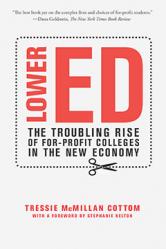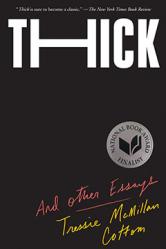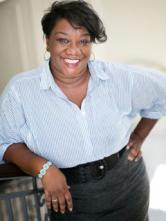AUTHOR SPOTLIGHT: Tressie McMillan Cottom
There’s a reason Tressie McMillan Cottom is called one of “America’s most bracing thinkers on race, gender, and capitalism” by Rebecca Traister, “no intellectual lightweight” by Brittney Cooper, and “the author you need to read now” by the Chicago Tribune. McMillan Cottom’s first book, Lower Ed, is a deep dive into the fraught dynamics of the big-money industry that is for-profit colleges. And her latest endeavor, Thick, effortlessly fuses the political, the social, and the personal in a vibrant collection about what it means to be a black woman in America. So we thought it only fitting to close out Women’s History Month by sitting down with McMillan Cottom to hear about her writing process as well as how she sees her role as a black woman intellectual.
Could you talk some about your process for writing Thick? What was the story you wanted to tell? How did you decide which pieces you wanted to include and which pieces you didn’t?
TRESSIE McMILLAN COTTOM: I wrote Thick with the idea that I needed to respond to contemporary debates about culture, economics, and politics from a place that I thought hadn’t been fully explored. I am always conscious of the fact that I am not a singular voice on issues, but I try to be a distinctive voice. I gathered twenty or so essays I had written over the past decade, and the theme became clear to me: I have been committed for a very long time to the idea of what black feminist philosophy and black women’s lives contribute to popular discourse and to pressing social questions. In the end I chose essays that were robust enough to warrant additional thinking—and then I threw them all out and rewrote them all from scratch, save one. So the ideas were embedded in my previous work, but the essays that appear in this volume are for the most part iterations of previous essays. I hope that shows that my thinking is not stuck in a moment in time and that, hopefully, it never will be. Above all else in the writing process, I wanted to respect the fact that these conversations are ongoing. They are living, breathing discourses, and I wanted to in my own small way further open those discourses up to deeper and more nuanced thinking.
In the opening essay, also entitled “Thick,” you write, “Fixing my feet became a way of life for me, an undercurrent of thousands of messages that form the subconscious playlist of our identity. It plays alongside other whispers like, ‘work twice as hard’ and ‘keep your legs closed’ and ‘don’t talk to strangers’ and ‘don’t be a stranger’ and ‘remember who you are and where you came from.’” What does it mean to fix your feet? Do you find that you still have to “fix your feet”?
TMC: Fixing my feet is my way of understanding the idea of double consciousness or the veil that Du Bois talks about in reference to black Americans. It is about holding ideas about your own biography—who you are, who made you, where you came from, your agency in your decision-making—holding those ideas simultaneously with the reality of the history, the politics, the economics, and the culture that delimit how much agency you have. It is living trapped between those two things that I think black feminist philosophy has been most deeply engaged in explaining. And that is where I think our lives unfold: trapped in between holding those two ideas that are often in conflict with each other.
As a black woman I will always have to fix my feet, but I also try to be very honest about locating myself as I have moved up, in, along, and through the class hierarchy. For example, my class status absolutely changes how I’m able to fix my feet if only in that it affords me the economic resources to fix my feet differently or to choose a situation where I have to fix my feet. But my mobility along the class hierarchy has not changed the fact that I still have to fix my feet. I’m allowed to choose when and how I’ll do so, but my experience is that neither my class status, my celebrity status, nor my esteem changes the fact that I have to fix my feet.
You, among other black feminists, write about the failures of mainstream white feminism to adequately respond to the needs of all women. What do you say to black women and women of color who feel left out of feminism? What can white feminists do to make their work more inclusive and intersectional?
TMC: I don’t know what white feminists must do to make their work more inclusive and intersectional. I do know that I have decided that figuring that out is not my work. My work is about figuring out how black women have done what we do to continue to survive.
I do hope that I hold white feminist ideologies’ feet to the fire about the places where they have been less likely to reflect upon the extent to which their individual choices delimit the individual choices available to black women. I am also very critical about the role that black Western feminism has played in being a handmaiden to some of the excesses of white feminism. For example, I think that there is a healthy conversation to have about the role that black feminism has played in marginalizing feminisms from outside of Western culture, but again I’m far from the first person to think about that or to write about it. I do try to center it in a way that is about the everyday life of living our theory.
What is your assessment of the #MeToo movement? Is this another space where little room has been made for the struggles of black women and women of color?
TMC: #MeToo is interesting in that whether or not it includes black women and women of color depends on in which historical tradition you locate it. When #MeToo initially started, it erased some of the very public work that had been done by women like Tarana Burke. But that speaks to how important it is for black women thinkers and philosophers and writers and critics to be engaged seriously as intellectual producers of a body of knowledge. It is because of black women thinkers and writers and critics that we are able to push back on the decontextualization of this history and that we now have a course corrective.
#MeToo will continue to struggle, I believe, with the things that are difficult for all of us in this culture, like pushing back against our collective interest in white women’s stories at the expense of other people’s stories. We will continue to have to push back against the economic incentives that tend to be more interested in a diverse perspective of white feminist lives and theories than they are about black feminist thinkers. We’ll have to continue to push back against the fact that there are cultural incentives for some women and not other women to speak up about sexual abuse and sexual oppression. And I still think that #MeToo has a long way to go in thinking about some of the things I talk about in Thick: the ethics and politics of beauty and preference, who is desirable, and how we deal with wanting to be desirable in a political economy that attaches a great deal of value to being a desirable femme body.
What has the response to the book been? Has it changed how you are “seen” in your field?
TMC: The response that I hear the most, probably because I am attuned to hearing it, is like the response I heard recently from two young black women at Yale University. They came up to me after a conversation with Roxane Gay and other writers on how to write trauma. They had read Thick in one of their courses and said, “This is one of the only things that has ever been assigned to us to read in class where our white colleagues cannot generalize it to themselves. We felt so fully seen and realized that this must be how they feel all the time in class.” This is one of the first texts where they couldn’t strip or de-center black women in their analysis of the text; for once, the conversation had to be about black women’s lives and black women’s lives only. So the response from black women who say things to me like, “I feel so seen,” and, “finally the words to articulate what I have felt and experienced”—that response means everything to me, because every editorial decision and decision about craft that I made throughout this collection was made with the idea of deciding that black women’s knowledge was going to be taken for granted in the reading of this text.
I do think the book has changed how I am seen in the field. I think for a lot of people, the book bridges my work in a way that finally makes what I have done legible. So some people have struggled, for example, to reconcile that I am an empirical sociologist—I collect data, I do field work, I do traditional work, but I also apply that traditional training to these broader cultural discussions. People have been inclined to think of those as two different threads of my work, but I have always thought of them as the same. I attribute that to the fact that there are not many models for the type of work that I have tried to do and continue to try to do as an academic, that there have not been any recent models of any way of people attempting to hold both threads of the career simultaneously. But as I said earlier, being a black woman is all about holding multiple ideas simultaneously and operating on multiple levels of thinking and doing and being. So for me it was not at all strange to be doing both of these bodies of work and not to think of them as being distinct from each other.



